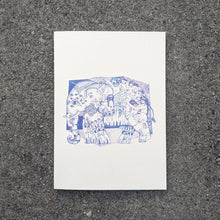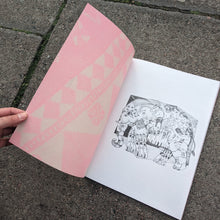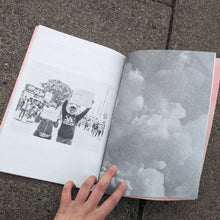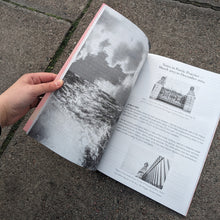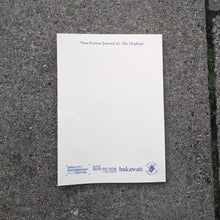
Non-Fiction is a journal from Open City Documentary Festival. The publication was launched in 2020 with the aim to create a space for considered, critical and creative writing on non-fiction, featuring contributions offered in response to moving image, audio or cross-media, both contemporary and historical.
Non-Fiction 07: The Elephant was edited by Elhum Shakerifar and includes writing and artwork by Abiba Coulibaly, Barby Asante, Elhum Shakerifar, Emma Cheung, Golrokh Nafisi, Helene Kazan, JC Niala, Jenny Clarke, Melek Erdal, Mika Ogai, Momtaza Mehri, Mouna Kasa and So Mayer.
A4, 72pp, perfect-bound, risograph printed on recycled paper by Burley Fisher Community Press. The risograph design of this journal quietly highlights textures gleaned between the lines of each essay and contribution – a tangible digital to analogue translation of sorts.
Along with the risograph print edition of The Elephant, an 8 page A5 zine was designed for printing at home/at a local risograph press. The PDF can be found here. The instructions are simple:
- Print the first side on an A3 sheet then flip along the long edge and print the second side
- Fold in half along the horizontal centre, then fold in half again along the vertical centre
- Cut about 5mm from the top, bottom and right sides of the folded paper
- Staple in the middle!
(This design can be made with an A4 sheet to make an A6 zine)
The journal has already been published online and can be read here.
Here is an extract from Elhum's introduction:
When I was invited to guest edit this edition of Non-Fiction Journal, my thoughts immediately turned to the poetry that has long provided compass and solace for my work in the creative space—as a translator, as a poet, and as a film producer and curator. These hats might appear to be very different, but they are all facets of the same kind of quest, I feel—leaps of faith, questions posed to a world in constant flux. I understand documentary to be a process of translation in time, ideas, energies. Long before being a one of my ‘jobs’, translation was the prism through which I—like all migrant children—saw the world. It carries ambivalence and ambiguity close, a perpetual process opening and closing the possibility of holding several truths at once.
A fable that I often come back to when reflecting on the ways in which we tell the world is the story of the elephant in the dark room—a story recounted by Mawlana (Rumi) amongst others, in which a number of people find themselves in a dark room conscious of the presence of an elephant—something they cannot see, and yet sense and attempt to grasp. Each person touches the elephant to better understand what it is. For one, an elephant is something large and solid like a tree trunk. For another, an elephant is more like a pipe. And for another, an elephant is like a leathery flag. While they share their perceptions with each other, their understandings of ‘the elephant’ differ significantly and yet, they are all relaying facts and are all telling the truth. This fable has always represented to me the fact that reality is too large to make sense of, and that our individual stories give it form.





